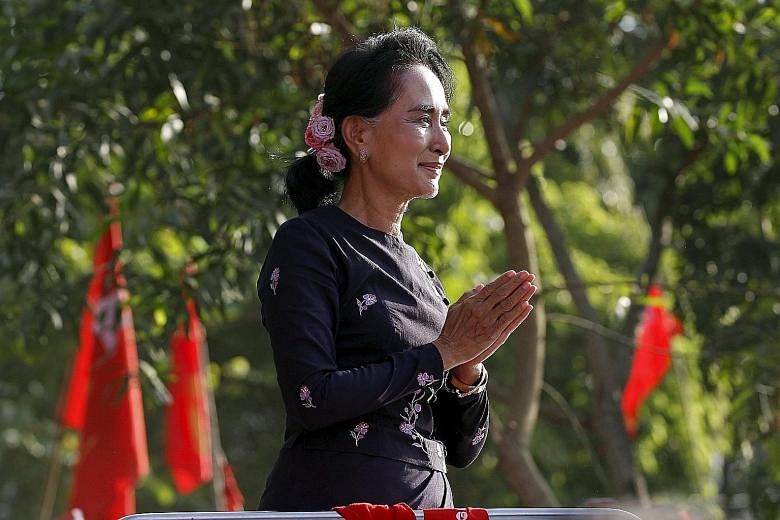In the early months of 1942, as British Burma fell to the Japanese, an indigenous entity, the Burmese Independence Army (BIA), became the effective government of the Crown colony.
The Japanese soon found themselves powerless against the BIA, which drew its authority from a close link between its army and the long-neglected villages of Burma.
When the British returned, they were unable to assert control for the same reason. Thus, when an independent Burma emerged in 1948, its military, the Tatmadaw, unsurprisingly assumed a dominant role. Its relationship with the countryside cemented that position for over six decades.
But then, last November, everything changed.
When Ms Aung San Suu Kyi's National League for Democracy (NLD) defeated the Tatmadaw-backed Union Solidarity and Development Party by a landslide, it seemed as if the villages, which broke the Japanese, expelled the British and kept a globally-unpopular regime in power for two decades, finally shifted their allegiance.
With such overwhelming support, it seemed obvious that Ms Suu Kyi's time to act with reformist vigour had finally come.
Yet, the people of Myanmar have heard little since. When considered alongside the few indications which have been given of the future, it appears likely that, when Parliament is seated later this year, it will not be led by the revolutionary denied power in 1990, but by a pragmatic conservative Myanmar does not need in 2016.
Nothing is more demonstrative of this than the retreat from the aggressive promises made and language used while campaigning, leading to a legitimate question of whether Ms Suu Kyi's desire to not "rock the boat" will actually mean a continuation of the status quo she has devoted her life to changing.
For example, on the trail, Ms Suu Kyi and her party frequently brought up the need to make Myanmar's government more efficient by reducing the number of employees in certain ministries, including the Tatmadaw (which the NLD's manifesto vowed to make "strategically efficient").
However, after the election, an NLD parliamentarian told the New York Times that there are now no plans to reduce the size, or power, of the military-dominated bureaucracy, preferring to maintain business-as-usual to ensure "national reconciliation".
A comparable about-face was made on Constitution reform, the subject of a major push by Ms Suu Kyi last summer and the source of a powerful threat days before the election (her claim that she would be "above the president"), but now entirely dismissed as a goal by Ms Suu Kyi's closest advisers.
Similarly, before last November, Ms Suu Kyi regularly spoke about the specific talent within the NLD that she would use to execute her plans. However, since the election, there have been frequent reports of warnings heeded that the NLD must use the right people, implying that Ms Suu Kyi's selections will not be so independent.
Furthermore, Ms Suu Kyi's continued failure to address Myanmar's growing human rights crises seems to indicate that she is no longer the crusader she once was. After all, her pursuit of human rights brought her global acclaim in the late 1980s and early 1990s, and contributed to her Nobel Peace Prize.
Thus, the unprecedented mandate presented to her from her people should provide more than enough power for her to comfortably face the issue that has defined her career. Yet, she has done nothing.
For instance, the growing abuses of Rohingya Muslims across displacement camps in western Myanmar and the current government's attacks against indigenous Kachins in northern Myanmar have been well-documented by international organisations, but have been dismissed as insignificant, or not addressed at all, by the most powerful woman in Myanmar.
This silence becomes even more alarming, considering that in the NLD's landslide victory, it not only defeated the military-backed party, but also the ethnic parties whose sole focus was human rights and, without which, the issue may not receive any attention.
Pragmatically, this makes sense. With the NLD's support largely from Myanmar's Buddhists, Ms Suu Kyi the politician does not need such minority groups for electoral or legislative success, making her silence on human rights, when coupled with the aforementioned signals that she wants to avoid cataclysmic change, particularly worrying as the crisis grows worse with time.
Finally, this silence and new-found practicality is not what Myanmar needs, especially for an emerging market in the crucial years of its adolescence.
While the NLD's manifesto contained broad economic goals, it was universally criticised for lacking specifics and, without any further guidance, foreign investors are now being forced to act based on little more than their own guesses for the future, a huge disincentive for market entry.
This has especially spooked nations like Japan, whose investors rapidly entered the market after 2011 (and who are currently funding the creation of Yangon's stock exchange) and have provided considerable infrastructure and aid to the nation.
Neither Ms Suu Kyi nor the NLD has indicated the fate of such investments developed under military rule, beneficial for their own goal of not "rocking the boat", but potentially devastating to the corporations and individuals who must make projections and build their own businesses - an uncertainty that could deprive Myanmar of the capital it so badly needs.
Thus, all these signs point to the conclusion that, when the NLD assumes a majority this year, the dream denied in 1990 will remain elusive. Even though Ms Suu Kyi and her allies will have the legitimacy crucial to governing Myanmar and a base of power providing the ability to realise the reforms she always desired, it seems highly likely that will not be the case, potentially even at the detriment of Myanmar's economy.
Exit the Lady, enter the politician.
- The writer is the executive editor of the Virginia Journal Of International Law in the United States.

